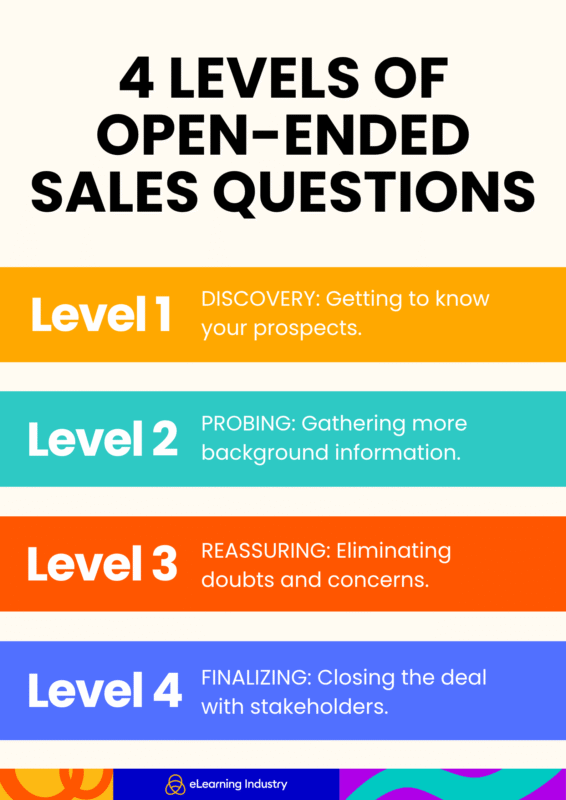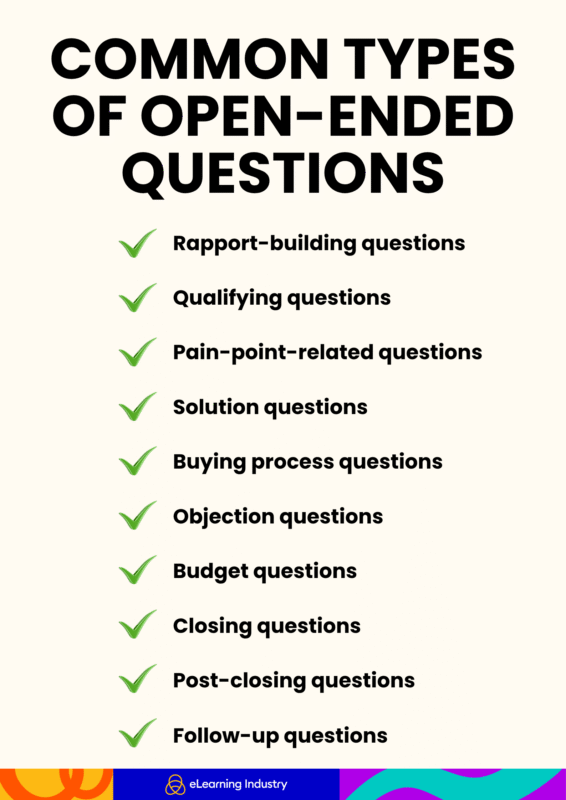What Are Open-Ended Sales Questions?
If you are looking for open-ended question examples for sales, you are at the right spot. But first, let's explore what open-ended questions actually are. In a customer acquisition strategy, your goal is to attain as much context and information about your prospects as possible. Open-ended questions probe people to share more about their needs, challenges, and preferences. The point isn't to get a yes or a no, but to spark a meaningful conversation with valuable insights and engagement. Close-ended questions may often feel like an interrogation, while open-ended discussions prove to people that you care about their individual objectives. This way, you understand how a certain decision-maker buys software and their triggers.
Imagine you want to close a sale of your LMS software. Instead of asking prospects, "Can I help you?" ask them, "How can I help you meet your project's goals?" They are thus encouraged to talk about their urgencies and tell you exactly what they expect from you.
In This Guide, You Will Find...
- The Benefits Of Open-Ended Questions In Sales
- Open-Ended Vs. Close-Ended: Core Differences
- 66 Open-Ended Question Examples To Close That Deal
The Benefits Of Open-Ended Questions In Sales
-
Engagement
Once you've identified your leads through sales prospecting, it's time to make your pitch. Instead of going all salesy on them, prepare open-ended sales interview questions. They allow people to explain their situation, needs, and interests in detail. Rapport building in sales is pivotal, and this sort of question does exactly that, as your conversations feel like friendly dialogue, not relentless sales pitches.
-
Discover Pain Points
You don't necessarily need perfect sales pitch examples to close deals. If you don't keep prospects engaged, you won't know what troubles them. Start gently by engaging them and then asking questions that uncover their struggles. The more people talk to you, the more they talk about their pain points and specific software problems. For example, your B2B sales questions might nudge them to tell you exactly what feature of their current HR tech software annoys them. Then, you can explain how your tool can solve that issue. Remember that active listening in sales is necessary to convert prospects into buyers.
-
Trust
Another benefit of open-ended sales questions is that they build trust since you show people that you genuinely care about their challenges. You don't simply want to get their signature on a contract, but serve them a powerful solution that will help them reach their goals. This is invaluable, as the more prospects trust you, the more they open up to you. Basically, you cultivate your customer lifetime value before they even sign.
-
Objections
A customer may already have done research regarding your company and product or even completed a free trial. Targeted open-ended questions encourage people to share their objections with you. Maybe they don't understand the value of certain features, or the price is too high for them. You should be prepared to answer these objections and tailor your package just for their needs. This way, it's clear that you are ready to do whatever is necessary to help them.

Open-Ended Vs. Close-Ended: Core Differences
Open-ended vs. closed questions in sales isn't a battle with a clear-cut winner or loser. It's about knowing when to ask each. Not every single question should be long and detailed. Sometimes, you just have to combine the two of them to extract the information you need.
-
Open-Ended Questions
Most of the open-ended question examples we'll share shortly begin with the words "why," "what," and "how." That's because you want to encourage long answers. The goal is to gather non-numerical, qualitative data. The answers are not predetermined. Potential buyers have to fully explain their answers in their own words. That's the case whether you are writing a follow-up email after no response or engaging in a live call.
-
Closed-Ended Questions
On the other hand, sales qualification questions may often only require a "yes," a "no," or maybe a "not sure." In other cases, you may provide them with a multiple-choice question that includes 3–4 predetermined answers. Your goal here is to gather numerical, quantitative data that helps you get a definite answer on a specific area.
66 Open-Ended Question Examples To Close That Deal

Rapport-Building Questions
These open-ended sales question examples aim to bring you closer to your prospects. You want to show them that you care deeply about them and their companies. Also, you want them to understand that you have done your research and, ultimately, build trust. You make it obvious that your goal isn't solely to get more customers but to understand each individual's needs.
- What do you hope to accomplish with employee engagement software?
- What is the most challenging problem you are dealing with in your business/department right now?
- Is there any way I can help you with [issue]?
- I read on your LinkedIn post that you spoke at [event] about your struggles building your company. How did you overcome those struggles?
- Many of our clients in the eLearning industry tell us they have trouble marketing their courses. Is this something you've struggled with?
- I'd love to learn more about your company's culture. How do you keep employees engaged and loyal?
- Since you're interested in creating relevant content, I was wondering if you'd want to create eBooks and other resources?
- I saw on social media that your company just started using [competitor's product]. What's been your experience so far?
- I was browsing your company's site when I came across a blog post. I loved it, but I noticed that the SEO wasn't well optimized. Is this an area you struggle with?
- Your company seems to host quite a few events fairly often. How are they going? Is it easy to get subscribers?
Qualifying Questions
Lead qualification is one of the sales pipeline management processes. This is where you try to understand whether a prospect is worth rallying after. Is your product a good fit for them? Are they ready to move forward, or do they take an extremely long time to make a decision? These buyer intent questions will help you tremendously.
- Why are your L&D struggles a priority for you right now?
- How quickly do you plan to assess your options?
- Are you considering other companies?
- What do you think of our services and offer so far?
- How would you like for us to move forward after this meeting?
- How do you usually work on new projects? Do you prioritize them?
- What has changed since our last interaction?
Pain-Point-Related Questions
Another way to use open-ended question examples is during the sales stage by focusing on pain points. You want to uncover your prospects' current processes and why they don't work. By discovering challenges, frustrations, and past unmet needs, you have the opportunity to present yourself as the ideal solution.
- Why isn't your current process working?
- What's preventing you from hitting your goals?
- What challenges are you looking to solve?
- What improvements are you seeking?
- Have you tried to resolve this before? What happened?
- What eLearning tools have you used so far, and what issues did you have?
- What onboarding mistakes have you stumbled upon so far? What would you like your software provider to provide?
- What changes in your customer demands are influencing your decisions?
- What changes in the competitive landscape are impacting your business?
- You are currently looking for an alternative solution. Why is that? What prompted you to search for a new solution?
Solution Questions
Before you even start using elevator pitch examples, it's best to understand your potential buyers' expectations. Once you know what they need from a partner, you can tailor your proposal accordingly.
- What does the ideal time-tracking software look like to you? What features would you like it to have?
- Based on what criteria do you judge a solution? What do you pay attention to during a trial?
- What is your timeline for overcoming your struggles?
- What are your expectations from a provider during the onboarding stage and after that is over?
- How do you define success? For example, if you choose a certain course provider, which metrics would you track to judge a course's impact on learners?
- If you could create the perfect LMS, how would it function?
Buying Process Questions
Not every company has the same buying process. An enterprise may involve various roles in the final decision-making stage. On the other hand, a smaller company may only involve 2–3 people. So, get to know who is involved and how they decide which software to purchase. This way, you can help them better.
- What does your decision-making process look like? Who is involved?
- What information do you usually require to reach your final decision?
- What obstacles have you faced in the past during similar processes?
- What is a massive red flag to you?
- What is your timeline for making a purchase?
Objection Questions
There is no objection you can't handle if you use the right open-ended question examples. There is no way someone decides to buy your solution without a single objection. These situations are opportunities for you to elevate your solution and make people feel at ease.
- What is your biggest concern moving forward?
- What would make you feel more comfortable? What could we offer you more of?
- How have past business choices fallen short?
- What additional resources and information do you need to feel certain?
- What potential risks and hiccups are you most worried about?
Budget Questions
No matter what lead gen tactics you use to attract customers, if your solution is out of their budget, they won't purchase. Knowing how much they can spend before you make your proposal is essential.
- What budget do you have right now for digital marketing solutions (eBooks, webinars, banner ads, etc.)?
- What if your current budget isn't enough to fund the solution you need? Would you be open to increasing it?
- What other sources of funding can be explored, if absolutely needed?
Closing Questions
Knowing when and how to ask closing questions should be among your top selling skills. You can go for the hard sell if you are confident a prospect is really close to saying yes. However, in any other case, it's best to invest in open-ended questions.
- Judging from your reactions so far, our authoring tool appears to be a perfect fit for you. Are you ready to move to the next and final step?
- What would it look like if our software helped you achieve your goals?
- If we closed that deal today, what would this mean to you?
- To recap, our solution offers you [benefits]. How do these align with your objectives?
- What else can I do to help you finalize your decision?
- If you are unsure about investing in our services long-term, why not try out our 14-day free trial?
- How do we compare to other employee onboarding software? Is there anything else we could offer you?
Post-Closing Questions
Once your great open-ended questions get you those deals, your efforts to maintain great business relationships continue. It's an effective way to reduce customer churn and ensure people get the guidance they need.
- What made you decide to reach out to us and close the deal?
- Is there anything you need to get you started?
- What would you like us to do during the onboarding process to help you get familiar with our payroll software?
- What questions do you have about the onboarding process?
- How would you like to measure your success with us?
Follow-Up Questions
We left this for last, since follow-up questions can be used during all stages of the sales process. These open-ended question examples help you clarify what your high-quality business leads need and how you can assist them further.
- Could you please tell me more about that?
- What do you mean when you say that...?
- Would you mind giving me an example so I can fully understand?
- How did this issue affect your team?
- Why do you think this issue appeared and your previous solutions didn't work?
- What other thoughts do you have?
- Why is solving this matter important to you?
- What led you to [X] conclusion?
Key Takeaway
These open-ended question examples have one core goal in mind: to maintain sales funnel engagement. Once you have that, then you can proceed to tackle objections and close deals. The moment you lose your prospects' engagement, there is no room for further communication. So, spend some time preparing for your sales call based on each prospect's unique circumstances and prior interactions. The right follow-up questions can make clients feel heard and important. They should feel that you are paying attention to them and really care about their needs.
You can definitely combine open-ended with closed-ended questions when you think it's necessary to collect quantitative data. The more information you get regarding your potential buyers, the more willing they will be to make a deal with you. But the effort doesn't stop there. Maintain open dialogue and guidance post-purchase to keep people happy. This way, you can easily request customer testimonials and be certain they will be triumphant.
Open-ended sales questions are queries that encourage prospects to give detailed responses rather than simple yes/no answers. They help uncover needs, challenges, and preferences by sparking meaningful conversations.
Open-ended questions require detailed, descriptive answers, while closed-ended questions can be answered with a “yes,” “no,” or short specific responses. Both are useful but serve different purposes in sales.
They build rapport, encourage prospects to share pain points, and help salespeople understand what buyers truly need, which increases trust and improves the chances of closing deals.
By inviting prospects to explain their challenges and frustrations, open-ended questions reveal specific problems your product or service can solve, enabling a more tailored sales approach.
Use open-ended questions to explore needs and build relationships; use closed-ended questions to confirm details, qualify leads, or gather specific information quickly.

